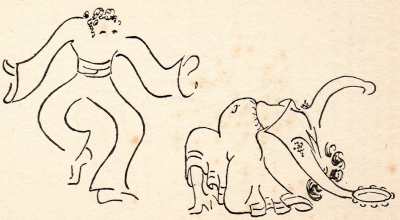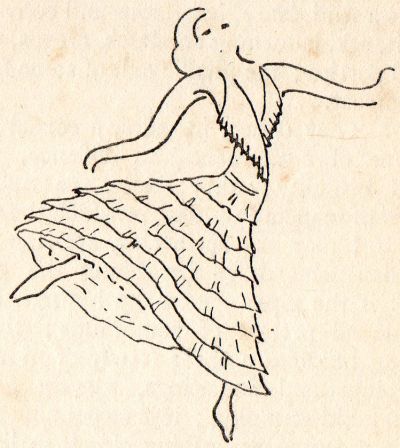Chapter Thirty – Flamencos (Part Four)
Gitanos : Guitar : Hija : Chiquita : Jota : Muy : Ole : Palmoteo : Rondalla : U : Zapatear
Gitanos : They dance, in pairs, a sexual pantomime of enticement and defiance, wooing and brutality; they dance the traditional duet of man and woman, in which the woman is, if I may say so, a slut, and the man is a ruffian who drags her along the ground.

But if the gipsy dances by himself, he lays aside all pretext of pantomime; then the thing becomes a sheer frenzy of movement, leapings and squattings, soaring gestures, and rabid stamping; it is so genuine a dance that it expresses nothing else than liberated fire.
Guitar : The sounds it makes are utterly different from what we here imagine them to be; it rings metallically like a cutlass, it rattles defiantly and harshly; it does not growl, nor does it croon, coo or rustle, but it twangs like a bow-string, rumbles like a kettle-drum, clatters like sheet-iron; it is a manly and boisterous instrument, played by fellows who look like mountain-brigands and who pluck at the strings with curt and jerky movements of the fingers.
Hija : ¡ ole ! ¡ hija !
Chiquita : ¡ Bueno ! ¡ bueno ! chiquita.

Jota : The jota of Arragon is both a song and a dance; a song with a heavy cadence, strange and harsh, which dashes on abruptly and then slackens, extremely Moorish, but without the flourishes which distinguish the flamenco; each verse swerves suddenly into a protracted and drooping lamentation. And the jota is also a very attractive dance, swift and unfettered, with a jaunty, galloping rhythm which surges forth from the rounded slackening plain-song.
Muy : ¡ Bueno, chica ! ¡ Otra, orta !
Ole : ¡ Niña ! ¡ Ea !
Palmoteo: Or hand-clapping. While one of the group dances, the others sit around and beat time by clapping their hands, as if unable to hold out against the rhythmic eddy which is poured along the cascading of the guitars. And they bawl. And they stamp their feet. And the guitar-players rock themselves to and fro in their chairs, stamp their feet and bawl. And on top of all this the castanets.
Rondalla : This is a fat-bellied mandoline of Arragon which produces a metallic and melodious clatter, and harmonizes with the time of the iotas.
U : The U is a song of Valencia, the ecstatic scream of a singer amid the blare of trumpets and the feverish whirling of castanets; never have I heard such a fervid singing as this long and appalling tense yell of the Moors.
Zapatear : Or to stamp with a rhythmic gusto.
